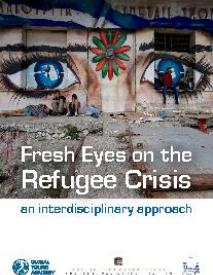Fresh Eyes on the Refugee Crisis: an interdisciplinary approach
With immigration dominating headlines and political agendas across Europe and elsewhere, and increasing numbers of refugees and asylum seekers, the Global Young Academy, the Royal Netherlands Academy of Arts and Sciences, and the Dutch Young Academy decided to explore this agenda through an interdisciplinary lens. Over twenty young scientists – with wide-ranging expertise and hailing from over 10 countries - met in Amsterdam in December 2015 to discuss the refugee crisis1, with a particular but not exclusive focus on integration issues in Europe. The participants concluded that models of integration which respect diversity, democracy and the fundamental European values2 of human dignity, freedom, equality, solidarity and human rights pose a challenge for the EU and its Member States. There is a clear tension between integrating increasing numbers of refugees ethically and efficiently, whilst satisfying the interests both of refugees and citizens of host countries. The
participants identified four distinct areas that require further attention, and to which the global research community can readily contribute: 1. Understanding the problem: identifying areas where conceptual theory, empirical evidence and better data are required to support policymaking The dynamic between refugees and citizens of host countries needs to be better understood: a) acknowledging the concept of cultural values within communities and how this can be better utilised in political negotiations; b) redefining what the fundamental European value of solidarity means to enhance our conceptual and normative understanding, and ultimately help shape better policymaking. 2. Practical actions and interventions: building on good practice a) encouraging multilateral policy fora (EU,
OECD) to commission an international comparative study of job market integration to identify and share best practice; b) developing a networking programme to connect young scientists (the Global Young Academy (GYA) can help here) and others in the scientific community to refugees with similar skills in order to help them find appropriate work; c) working with civil society to scale up the establishment and connection of trust-based social networks, and sharing of best practice in non-formal education (such as communityled initiatives) - helping refugees to forge their own destiny.
3. Reframing the refugee debate: informing the public and policymakers objectively This requires innovative partnership with influential media agencies to develop an intelligent media strategy. Using traditional and social media, this strategy could help inform the public objectively, influence public opinion and ultimately public policy. 4. Addressing the root causes: reducing the need for people to flee their countries The UN is ideally placed to establish a mechanism for international engagement, coordination and coherence to address the root causes of failed states and why people flee their
countries, in order to design appropriate interventions argeted at failed and fragile states. More generally, there is a distinct role for science diplomacy [1] in this agenda. By virtue of the scientific values of rationality, transparency and universality, science/research can help alleviate cultural tensions and contribute to practical, evidence-based solutions. Recommendations are made primarily to the European Commission, given the focus on Europe. But there are also recommendations for the OECD, the UN, and the global research community to help mitigate and better manage the refugee crisis more widely, in recognition of the fact that Europe is only part of the picture. H2020 – the world’s largest research programme can potentially help fund some of these recommendations.
Geachte bezoeker,
De informatie die u nu opvraagt, kan door psychotraumanet niet aan u worden getoond. Dit kan verschillende redenen hebben,
waarvan (bescherming van het) auteursrecht de meeste voorkomende is. Wanneer het mogelijk is om u door te verwijzen naar de bron
van deze informatie, dan ziet u hier onder een link naar die plek.
Als er geen link staat, kunt u contact opnemen met de bibliotheek,
die u verder op weg kan helpen.
Met vriendelijke groet,
Het psychotraumanet-team.
Reference:
Eva Alisic, Rianne Letschert, Marieke Sleijpen, & Bram Klatser | 2016
1-11 | globalyoungacademy [host]
http://globalyoungacademy.net/wp-content/uploads/2016/02/Fresh-Eyes-on-the-Refugee-Crisis.pdf
1-11 | globalyoungacademy [host]
http://globalyoungacademy.net/wp-content/uploads/2016/02/Fresh-Eyes-on-the-Refugee-Crisis.pdf


